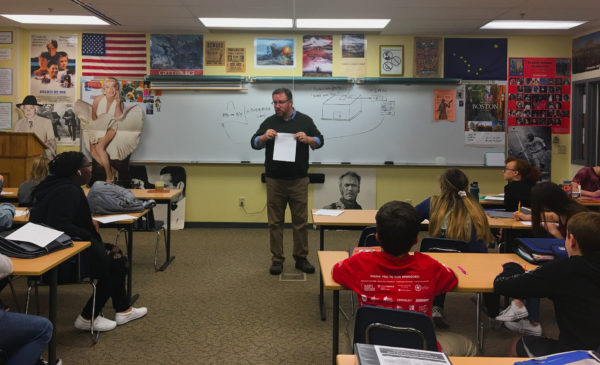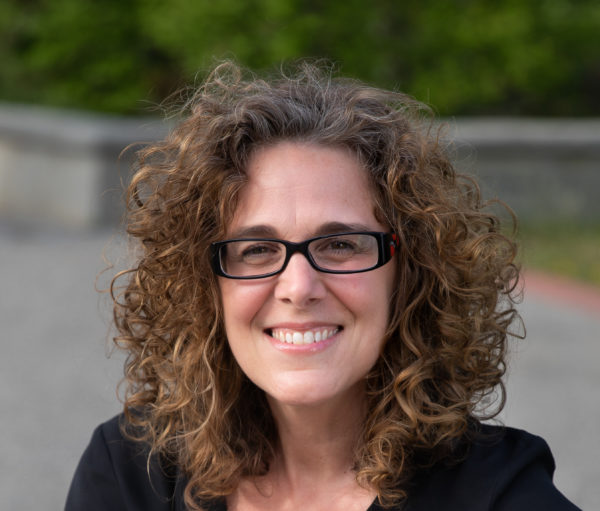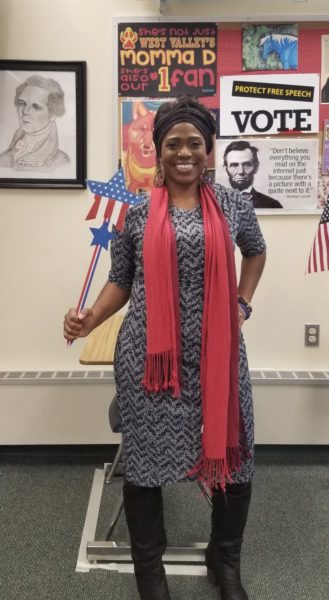
Electors across the country met Monday to cast the official electoral votes for President. It’s an important part of the election process that normally doesn’t receive much attention, especially from students.
RELATED: Alaska’s electoral college members cast their votes for Trump
But in a year where the current president has refused to accept the election results, it’s a rare opportunity for students to understand in real-time how a centuries-old institution, hotly debated at its creation, continues to function.
Teachers like Perry Lewis, a social studies teacher at Eagle River High School in Anchorage, have been using the opportunity to engage their students. Lewis said even though online teaching isn’t the easiest platform to host discussions, his students are paying attention.
“I spent quite a bit of time talking about the electoral college system and how that works,” Lewis said. “Primarily because that’s become fairly politicized.”
With students at home, and so much news coverage, it’s impossible for students to escape national politics, Lewis said. His students are eager to know as much as possible.
“It’s not like the ’80s or when I grew up in the late ’70s, where, occasionally, Mr. Carter and Mr. Reagan might bust in on by Sesame Street, and interrupt my life,” Lewis said. “Now, it’s just so encompassing to every angle of our lives. So, to me that was a bit of an eye-opener, that kids really were kind of craving an understanding of these things.”
Amy Gallaway noticed a renewed interest in all things electoral in her classes as well. Gallaway teaches government at West Valley High School in Fairbanks.

“In my 22 years of teaching civics, I can honestly say I’ve never had to deal with the fear that the transfer of power would not go peacefully,” Gallaway said. “That is very different this year.”
RELATED: Alaska Gov. Dunleavy says Biden has ‘outside chance’ of becoming next president
Gallaway polled her classes on how they felt about the election results, asking if they cared, if they were excited or if they were scared. This was the first time she included a scared category, she said.
“But I had at least 25% of my students who were nervous or scared, and that’s new.”
Gallaway said she spends a lot of time talking with students about topics like the importance of voting, voter disenfranchisement and understanding the relationship between citizens and political leaders.
She used interest in this election to talk about power. Gallaway said class discussions really illustrated what she always hopes her students take away from her civics lessons.
“Nothing is more important than their job as citizens,” Gallaway said. “They have to control the government or the government will control them. And one of the ways we do that is with a vote. And so, I think what’s so powerful about this year’s election is I’m not hearing people say, ‘My vote doesn’t really matter.’ I hear that all the time. And I haven’t heard that this year. Our representative democracy, it’s a participatory sport. You can’t watch it, you have to do it.”
For Heather Damario, who co-teaches with Gallaway at West Valley High, it was important to her that students learned different strategies for parsing information.

“I hear so much dissent and anger and frustration in regard to political parties that when I covered elections this year, I focused more on issues and not on candidates and political parties,” Damario said. “So I help students figure out what issues are important to them and why those issues are important. Let’s talk about them.”
Damario said her conversations ranged from Black Lives Matter protests and race in America, to the influence of geography on people’s political beliefs. Tackling these issues from a historical perspective helped students navigate uncomfortable or difficult situations, she said.
“People tend to think things are unprecedented,” Damario said. “Yes, it’s unprecedented for you, but in history, it’s not unprecedented … having a historical knowledge of present day really helps you make sense of the events that are taking place, whatever those events are.”
Damario said she often asked students to consider the source of information, whether they heard it from friends, family members, news outlets or other sites, and to think about how the source informed their beliefs.
“If they know how to find the information, they know how to have conversations about it, and they know what they care about,” Damario said. “They need an opportunity to care about something, and so having given them the opportunity to identify what that is was so valuable this election season.”
While the election is largely over, these Alaska teachers hope the lessons from this year will have a significant impact in the years to come.




